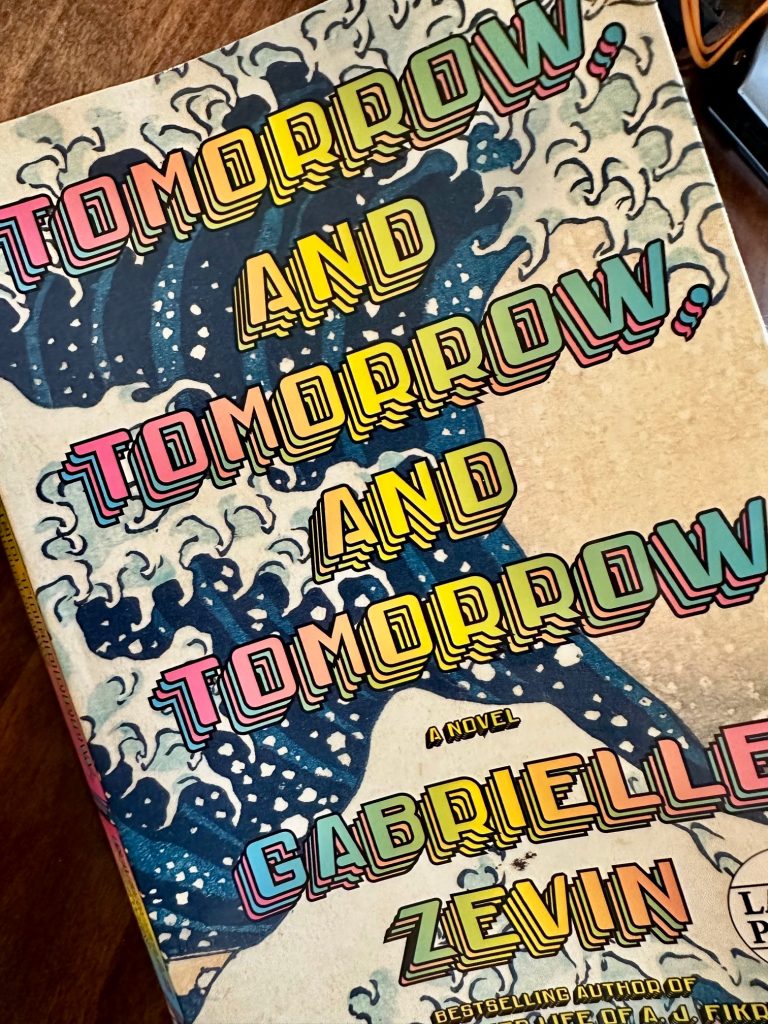 Why would I want to read a novel about video games and “gamers” if I don’t play video games? Because this book is about way more than video games. It’s about love (both friendships and romantic relationships), collaboration, artistic license, and how creativity brings people together (or tears them apart). It’s also about how trauma informs a lot of the aforementioned.
Why would I want to read a novel about video games and “gamers” if I don’t play video games? Because this book is about way more than video games. It’s about love (both friendships and romantic relationships), collaboration, artistic license, and how creativity brings people together (or tears them apart). It’s also about how trauma informs a lot of the aforementioned.
Without giving anything away, Tomorrow and Tomorrow and Tomorrow follows friends and collaborators Sadie and Sam through a variety of professional and personal successes and failures from childhood to college to adulthood. They are brilliant innovators who sometimes make history in their field and other times get in their own way. Sam and Sadie can’t help but run into each other – they are inextricably linked – no matter how many years go by without seeing or speaking to one another.
Author Gabrielle Zevin’s writing is an exercise in why showing rather than telling is so important. The reader learns the narrative timeframes through details like car phones, characters having to wait until they get home to check email, and programming technology rather than blatantly stating the year. There are also small anecdotes about PCs versus Mac computers which I found funny: “Unfortunately, the human brain is every bit as closed a system as a Mac.” As for style, going back and forth between timeframes and events is nothing new in terms of literary writing, but it’s worth mentioning that Zevin does an exceptional job directing and redirecting the reader to and from Sam and Sadie as children, college kids, and adults.
While the author makes a wide array of references throughout the narrative (including Macbeth, Donkey Kong, and The Oregon Trail) that resonate with all types of readers, my favorite references were the less obvious: The Great Wave (ubiquitous in Harvard and MIT dorm rooms) and Strawberry Thief which is described as “the story of failure and perseverance, of the discipline of a craftsman, of the life of an artist.”
Overall, Tomorrow and Tomorrow and Tomorrow is an exciting read as Zevin is able to seamlessly discuss and describe both harrowing and hilarious anecdotes and events, allowing the reader to clearly visualize the characters and their environments. That being said, the two parts of the book that are not my favorite are the switch to second person in “The NPC” section and the inside-the-game storyline in the “Pioneers” section. I get that those chapters are necessary, but they are also distracting and bizarre.
One of my favorite themes (that also functions as a metaphor) and carries on throughout the narrative is inviting others to play: “To allow yourself to play with another person is no small risk. It means allowing yourself to be open, to be exposed, to be hurt.” The idea of characters recognizing “an invitation to play” is, of course, about video games but also the notion that people inviting other people into their lives is something that should be cherished.
Quotes:
“He would know her handwriting anywhere.”
“People in LA only ever know about the part of town that they live in.”
“What greater enemy does one have than oneself?”
“To be good at something is not quite the same as loving it.”
“Sam was old enough to have noticed that simple things were often the most expensive.”
“What was amazing…was how quickly the world could shift.”
“They were tired, but it was an honest tiredness, the kind that comes when you know you have put everything you have into a project.”
“She was irritated by his muted reaction.”
“You try again. You fail better.”
“Life was always arriving.”
“The most successful people are also the most able to change their mindsets.”
“Love is both a constant and a variable at the same time.”
“She knew what it was to be ravenous with ambition but to have your reach exceed your grasp.”


Leave a Reply